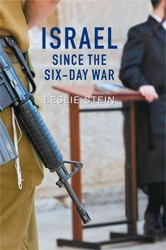In Catch-67, already a bestseller in Israel, Micah Goodman convincingly argues that although each side of the Israeli political divide believes they know the path to solving “the Palestinian problem,” both are incorrect. But at the same time, in their own ways, they are each also correct; that is what makes the issue so intractable.
Tracing the ideological shift from the liberal right to its current messianic-tinged conservative outlook emphasizing Israel’s need for militarily-defensible borders, alongside the left’s shift from socialism to holding diplomacy and human rights as its driving values, Goodman demonstrates the philosophical validity of both sides’ arguments.
Whereas in the technological sphere, Israeli culture actively encourages multiple perspectives and open dialogue — a perspective that has resulted in the renowned accomplishments of the “Start-up Nation” — when it comes to the Palestinians, Goodman laments, this pragmatic and collaborative attitude is absent. The inability to truly hear the other’s line of reasoning, and consider the identity-related issues their arguments emerge from, he argues, hinders the ability to propose solutions that may lead to a path forward.
Goodman confidently and articulately addresses controversial topics including the demographic threat Israel’s Arab population poses to the current Jewish majority; the arguments within Jewish law over how the valuing of human life impacts territorial concessions; the formation of a “Judeo-Muslim” narrative in place of a Judeo-Christian one; and the accusations that Israel’s treatment of Palestinians makes it an occupying, colonialist and apartheid state. Goodman separates fact from fiction, even-handedly presenting the case for reasonable arguments, and dismissing those which lack legal, political or historical justification.
Based on consultations with military and political leaders from both sides of Israel’s political spectrum, as well as Palestinians, Goodman courageously suggests two temporary initiatives that would necessitate concessions for all involved. He sees this as a step in the direction of eventual peace, without asking any stakeholders to forgo their core ideological beliefs.
Goodman concludes with a call for a return to the Talmudic value of constructive debate within Israeli society — one based on arguing, to be sure, but also based on the value of listening to the other side.
Dr. Stu Halpern is Senior Advisor to the Provost of Yeshiva University. He has edited or coedited 17 books, including Torah and Western Thought: Intellectual Portraits of Orthodoxy and Modernity and Books of the People: Revisiting Classic Works of Jewish Thought, and has lectured in synagogues, Hillels and adult Jewish educational settings across the U.S.





